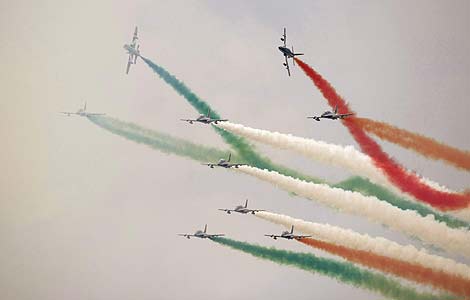China, Russia rail against EU aviation emission scheme
Updated: 2011-09-28 14:25
(Xinhua)
|
|||||||||||
BEIJING -- China and Russia on Sept 27 jointly railed against a European Union (EU) scheme to demand global airlines buy carbon emission permits, saying it infringes upon other countries' sovereignty and burdens global air carriers.
The EU's plan to force global flights to take part in the Emissions Trading Scheme (ETS) trespasses on the sovereignty of other countries and will "have an extremely negative impact on the international aviation industry," said China's Civil Aviation Administration (CAAC) in a joint statement with Russia's Transport Ministry.
According to the EU plan, as of January 2012, airlines flying to or from the bloc will have to buy permits from the EU's Emissions Trading Scheme (ETS) for 15 percent of the carbon emissions they generate, with large fines for noncompliance.
The joint statement said any solution must be based on agreement and mutual benefit and should be aimed at the sustainable development of the global aviation industry.
"We oppose any unilateral and mandatory moves that are taken without the agreement of involved parties on the aviation emission issue," said the statement.
It is estimated that the ETS scheme will cost Chinese airlines an additional 800 million yuan ($123 million) in the first year it goes into effect, and a total of 17.6 billion yuan by 2020, an official with the CAAC said last year.
The scheme will increase costs for the global aviation industry, which is already facing a paltry profit margin of 1.2 percent this year and a projected 0.8 percent profit margin for next year, said Director General and Chief Executive Officer Tony Tyler of the International Air Transport Association in Hong Kong last week.
U.S. airlines took the EU to the European Court of Justice in July, arguing that imposing the ETS on non-EU airlines breaches international law.
China and Russia will work together through the International Civil Aviation Organization under the United Nations to handle the emission issue properly, said the joint statement.
Related Stories
China to pilot carbon emission trading 2011-07-18 09:38
China to boost support for aviation 2011-07-11 13:42
Aviation industry profit up 27.3% 2011-07-25 16:55
China vows unconditional support for EU 2011-09-20 15:23
- Imported iron ore supplies decline in China
- Legend bulks up to get ready for listing
- Trade zone projects on border 'going well'
- Liquor makers ordered to stabilize prices
- China's auto exports surge 53.3% in Jan-July
- China propels Huawei's sales
- Where next for the ChiNext?
- Property owners warned over tax













